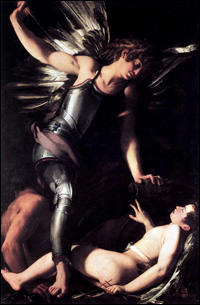Donne,
John. "Love's Deity." Poetry X. Ed. Jough Dempsey. 21 July 2003. Web.
19 October 2012. <http://poetry.poetryx.com/poems/884/>.
This poem, written by 16th century
English poet John Donne, relates the painful effects of loving someone who does
not reciprocate the notion. The god of love is viewed within the work as
irresponsible and immature, mismatching incompatible people. In the end the
subject tries, or at least has thoughts of trying to cast aside these agonizing
feelings. At the close, the narrator thinks of forcing the love of the
objectified, but realizes that the lie would indeed be worse.
Very plainly connected to the
central theme, the narrator ponders the great mystery of how to escape feeling
the misery related to unrequited love. The commonality once again involves
obsessing, this time over an actual person. The fantasy idealized once more in
a very self involved manner, feelings of attachment to the objectified entrap
the subject in a painful and solitary drudgery, seeking desperately for freedom
of this self-imposed imprisonment.
 |
| Heavenly Love and Earthly Love. 1602-03. Giovanni Baglione. Gemäldegalerie, Berlin. |
Who
died before the God of Love was born:
I
cannot think that he, who then loved most,
Sunk
so low as to love one which did scorn.
But
since this god produced a destiny,
And
that vice-nature, Custom, lets it be,
I
must love her that loves not me.
Sure,
they which made him god meant not so much,
Nor
he in his young godhead practised it;
But
when an even flame two hearts did touch,
His
office was indulgently to fit
Actives
to passives. Correspondency
Only
his subject was; it cannot be
Love,
till I love her that loves me.
But
every modern god will now extend
His
vast prerogative as far as Jove.
To
rage, to lust, to write to, to commend,
All
is the purlieu of the God of Love.
Oh
were we wakened by this tyranny
To
ungod this child again, it could not be
I
should love her who loves not me.
Rebel
and atheist too, why murmur I
As
though I felt the worst that love could do?
Love
might make me leave loving, or might try
A
deeper plague, to make her love me too,
Which,
since she loves before, I’m loth to see;
Falsehood
is worse than hate; and that must be,
If
she whom I love should love me.